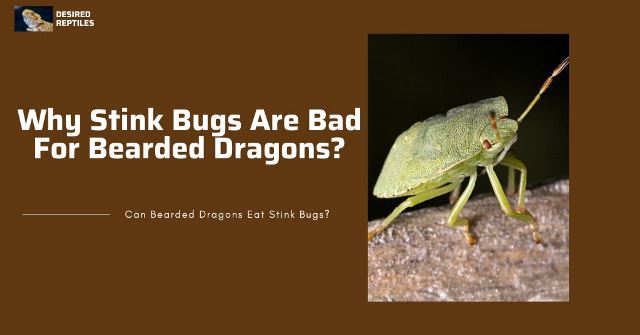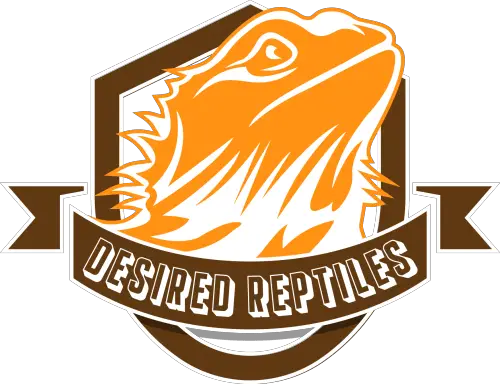Not all bugs are safe for bearded dragons to eat, despite being insectivores. Some are indigestible, nutritionally poor, and others are outrightly poisonous. So, what’s the deal with stink bugs and why can’t bearded dragons eat them?
Bearded dragons can’t eat stink bugs because they’re toxic to them, even species that are edible to humans. They contain high levels of phosphorus that, if eaten too often, can disrupt calcium metabolism, cause bone deformities, and lead to other illnesses.
If your bearded dragon mistakenly consumes a stink bug, don’t panic. This article equips you with the information to handle the situation like an expert. Let’s dive in.

4 Reasons Why Stink Bugs Are Bad for Your Bearded Dragon
Stink bugs are highly disruptive insects notorious for their impact on crop production. They quickly devour fruits and vegetables, and multiply quickly causing even more havoc. You may find the little ‘shield bugs’ crawling around your yard, especially if you live on or around farmland. So, it’s feasible for your pet to accidentally gobble one up.
If you’re wondering why beardies shouldn’t eat stink bugs, here are the major reasons:
1. Stink Bugs Are Too High in Phosphorus
Stink bugs are rich in iron, calcium, potassium, and, unfortunately for beardies, phosphorus. Phosphorus readily binds to calcium, preventing your pet from getting complete nourishment; that is why it’s crucial for calcium to exceed in quantity. The ‘beardie-safe’ mineral ratio of calcium and phosphorus is 2:1, which is typically found in most feeder bugs. However, in stink bugs, the phosphorus content equals calcium (2:2), which can reduce the essential nutrients your dragon needs for its bones and lead to metabolic bone disease.
2. Stink Bugs Can Be Nauseating to Beardies
Stink bugs secrete aromatic compounds when threatened, which give off the familiar bad smell. The secretions help prevent them from being eaten by predators including your beardie. If your pet eats a stink bug, the compound can cause vomiting and digestive problems. Although this is uncomfortable and highly stressful for your pet, it is not life-threatening.
3. Stink Bugs Are Difficult to Digest
Similar to mealworms and superworms, stink bugs have hard outer shells that protect them from their environment. This shell can cause impaction in young bearded dragons, as their digestive systems are not developed enough to properly excrete it. Impaction may seem mild but can quickly become fatal, especially for young, fragile dragons.
4. Stink Bugs Are Major Parasite Carriers
Every species of stink bug carries unique parasites that can be passed on to predators that eat them. If your bearded dragon consumes a stink bug, it can be exposed to these parasites which may cause serious illnesses. The threat of your pet eating parasitic stink bugs should be taken seriously as it’s difficult to treat infestations in bearded dragons. Some parasites reproduce quickly in a suitable host, which can cost you a significant bill and amount of time to treat your pet and restore its safe environment.
What To Do If Your Beardie Consumes A Stink Bug (And Is In Pain)
In case your bearded dragon has accidentally eaten a stink bug, here are effective things you can do to help:
Place Your Beardie On A Veggie Diet
Vegetables assist bowel movement in bearded dragons. If your pet has eaten a stink bug, you can help it flush out the excess phosphorus by feeding it watery veggies like cucumber and lettuce, with fruits like watermelon alongside their regular greens.
Do this for one week at intervals and monitor the stools until you are certain the crammed bug has been removed. Be sure to sprinkle calcium supplements on all of your pet’s meals to prevent its bones from weakening since calcium is highly compromised in this situation.
Give Your Beardie A Soak to Ease Impaction
Place your bearded dragon in shallow water for up to 30 minutes, massaging it gently going from underneath the belly towards the tail as if you’re nudging the junk out—this will help it poop out the stink bug it has eaten. If your pet is impacted and the bath or diet doesn’t help, rush to the vet for a proper exam.
The Vet Knows Best
Veterinarians know how to handle accidents concerning your beardies. Examinations will be carried out to assess the severity of the situation, and surgery may be required if your dragon ingested too many stink bugs. If surgery is not needed, a laxative may be prescribed to help your pet poop the stink bugs out.
How to Keep the Stink Bugs Out of Your Home & Away From Your Beardie
Stink bugs enter your home in search of warmth and food, especially when the weather outside gets chilly. These insects are an absolute nuisance to deal with as they can ruin your furniture and threaten your pet’s health. Here are three ways you can keep them out of your home:
Use An Insect Trap
For insects like stink bugs, an insect trap is the most effective way to reduce their population in your home (view on Amazon). An insect wax trap is highly effective in luring stink bugs out of hiding. Burn a candle in a container, and the bugs will be drawn to it as they’re attracted to warmth and light. Cover the container with the trapped bugs and put it in the freezer, or spray insecticide on them before disposing of them into the trash.
Use The Sock And Vacuum Method
This method involves making a temporary vacuum filter with a sock, which traps the bugs in the material when you vacuum. This prevents them from falling into the collector where they can crawl out and back into your home. Instead, you can collect the insects in the sock and dispose of them effectively in a way that will ensure no return.
Fill In The Gaps Around Your Home
Gaps and crevices are the easiest way for stink bugs to crawl into your home. Inspect the windows, doors, vents, and other potential entry points. If you notice holes or cracks big enough for bugs to get in, seal them up to avert re-entry. Remember, stink bugs are fair-weather insects attracted to warmth. If your household is properly sealed, you and your beardie will be spared the infestation.
Even More Dangerous Bugs Beardies Should Never Eat
Similar to stink bugs, other insects can cause serious harm to your beardie if eaten. Here are some specific bugs that are toxic to your bearded dragon:
Spiders
Spiders can be venomous or poisonous, posing a danger to your bearded dragon. They can cause digestive issues or affect your pet directly with their venom. If your beardie eats one, monitor it closely and take it to the vet immediately if you notice any unusual behavior.
Glow-worms
Glow-worms may be the most harmful bugs bearded dragons could eat. They contain toxins that can directly attack your pet’s heart, killing it instantly. If your beardie ingests a glow-worm, immediately take it to the vet to give it a fighting chance.
The Conclusion
Beardies eating stink bugs is much more common than you think. That is why it is important to understand the repercussions and preventive measures for such an accident. If you live in areas that are invaded by stink bugs, ensure that your home is properly sealed to keep the insects out, especially if you let your dragon roam around freely. Good luck!
